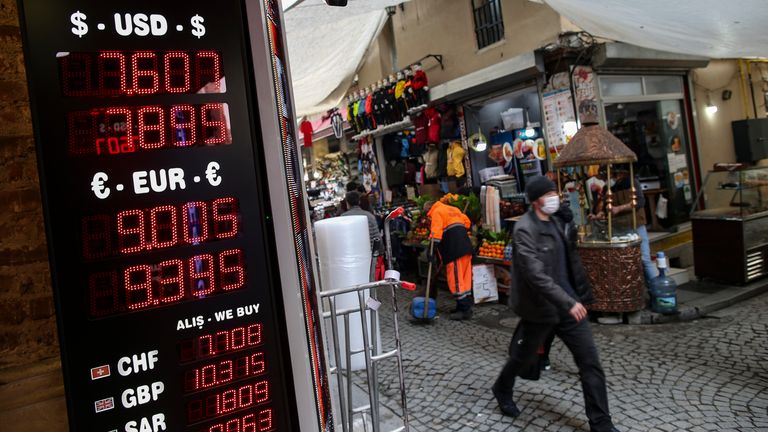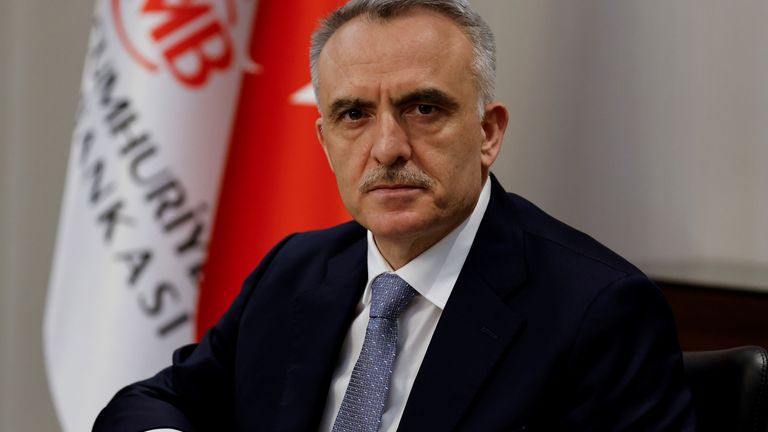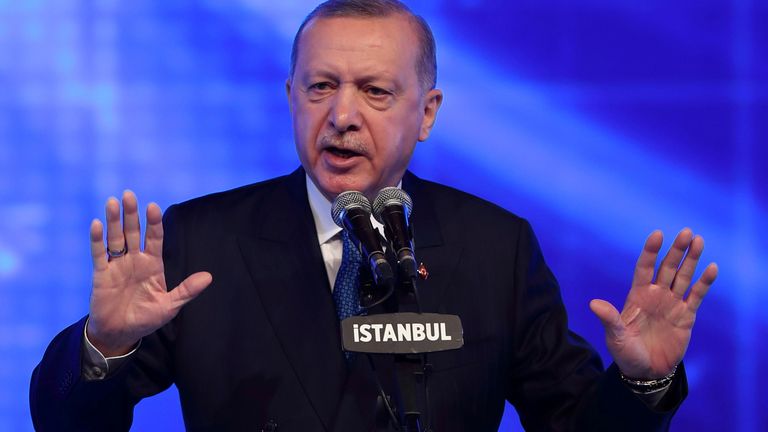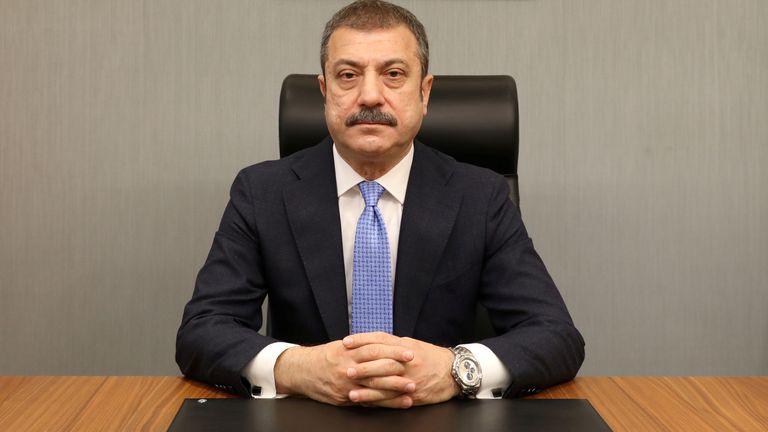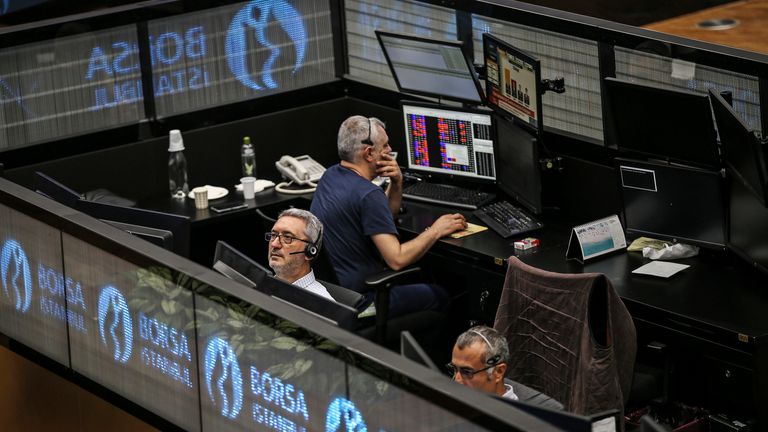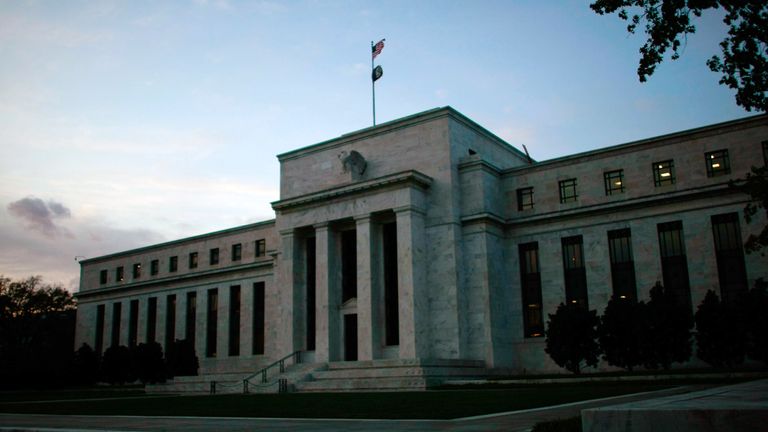Who is the harder taskmaster - Roman Abramovich or Recep Tayyip Erdogan?
Chelsea's billionaire owner has a reputation for being trigger-happy, as many of the managers he has fired will attest, with Frank Lampard the latest to be shown the door in January.
To judge from events in Istanbul during the last 48 hours, however, even being Chelsea manager carries more job security than being governor of the Central Bank of the Republic of Turkey (CBRT).
President Erdogan fired the latest incumbent, Naci Agbal, on Saturday after less than five months in the job.
It is the third time since July 2019 that he has removed the CBRT's governor.
Turkey is now on its fourth central bank governor in less than three years - a greater attrition rate than the west London club.
Mr Agbal had angered the Turkish president by raising interest rates from 17% to 19% on Thursday last week in an attempt to curb inflation.
This currently stands at 16% in Turkey - compared with the CBRT's target rate of 5%.
The latest appointee, Sahap Kavcioglu, is a member of Mr Erdogan's ruling Justice and Development Party and a former MP.
He is expected to cut interest rates before the CBRT's next scheduled policy meeting in April.
Departing alongside Mr Agbal was any vestige of credibility in Turkey's monetary policy.
That was highlighted by the market reaction.
The Turkish lira at one point fell by 15% against the US dollar and has now halved in value against the greenback in just under three years.
It has also halved in value against the euro in roughly the same period.
Elsewhere, the main Turkish stock index, the XU100, fell by just over 9.5%, while there was also a sell-off in Turkish government bonds.
The cost of insuring against the Turkish government defaulting on its debts, meanwhile, rose sharply.
The reaction is so sharp because the respected Mr Agbal had begun to restore confidence in the Turkish economy by highlighting his determination to combat inflation.
His appointment in November last year had sparked a rally in the lira from an all-time low and, remarkable, some foreign investors began investing in the country again.
Some $20bn of capital had come into Turkey, after years of outflows, following Mr Agbal's appointment.
But last Thursday's rise in interest rates, more than the market had expected, was intolerable for Mr Erdogan who, after his re-election in June 2018, declared himself an "enemy" of higher interest rates.
The new man, who is said to be close to Mr Erdogan's son-in-law and Turkey's former finance minister Berat Albayrak, is already being seen as a lame duck.
Jeffrey Halley, senior Asia Pacific market analyst at foreign exchange specialist OANDA, said: "The base premise of Erdonomics is that higher interest rates cause higher inflation, a theory that flies in the face of conventional economic theory everywhere.
"Mr Kavcioglu is a little-known business school professor who shares President Erdogan's economics theories and is, unsurprisingly, associated with the ruling party.
"Turkey will be an interesting example of what emerging markets can expect if inflation fears rise markedly."
Steen Jakobsen, chief investment officer at Saxo Bank, added: "The new political interference from Erdogan, who has long railed against hiking interest rates because he thinks they cause inflation, sent the lira into a tailspin on fears that international investors will pull their money from the country on concerns of new rate cuts that would undermine the orthodox bitter medicine of further interest rate hikes to stabilise and strengthen the currency.
"The country is already low on reserves and could, in extremis have to implement capital controls if capital flight, whether domestic or foreign, becomes a deepening problem.
"The Turkish lira's woes are seen as driving no real contagion risk across emerging market currencies."
Those comments reflect past experience in markets that, unlike a raunchy holiday in Bodrum, what happens in Turkey does not necessarily stay in Turkey.
During the summer of 2018, when Mr Erdogan began putting pressure on the CBRT to cut rates and got embroiled in a diplomatic row with the United States over steel and aluminium tariffs, the sell-off in Turkish assets spread to other emerging markets such as South Africa and Indonesia.
What happens next?
Well, for Turkey, the danger is that the government - which during the last year has already burned through half of its foreign exchange reserves - seeks to relieve pressure on the lira by, for example, seeking to limit the amount of business Turkish banks can do with foreign lenders.
There has also been talk of a financial transactions tax.
Countries, like Turkey, which issue large amounts of their debt denominated in US dollars are always exposed when the US dollar rises against their own currency.
With markets now starting to price in higher inflation in the US, thanks partly to the $1.9trn stimulus enacted by the Biden administration, some investors are starting to fret that the US Federal Reserve - which last week indicated it will not raise interest rates much before 2023 - may have to tighten monetary policy earlier than expected.
That would send the dollar higher and create a headache for a lot of emerging economies.
These economies have been busy raising money recently.
Data from the Institute of International Finance suggests that, in January alone, investors snapped up $44.2bn worth of emerging market debt.
Most of that was issued in local currencies like the Turkish lira but a decent chunk of it will have been denominated in dollars.
That will concern those investors with memories of the Latin American crisis in the late 1980s and the Asian crisis of late 1997.
No-one wants to see a re-run of those events - but what has happened in Turkey this weekend has raised the possibility of trouble ahead.


